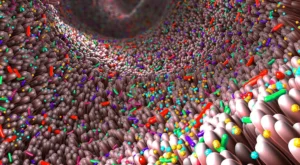Butyrate, classified as a short-chain fatty acid (SCFA), is one of the most critical postbiotic metabolites produced by your intestinal bacteria. Butyrate is made when certain strains of probiotic bacteria ferment non-digestible dietary fibers and polyphenols in your colon.i
Butyrate & Energy
The cells that line your colon are called colonocytes. These cells have the highest rate of turnover in the human body. Most people don’t realize that they create an entirely new lining of their colon every 5 to 7 days. It takes an enormous amount of energy for the body to be making these new cells constantly.ii
Butyrate is the primary energy source for the continual renewal of colonocytes. It has been estimated that approximately 10% of a human’s daily energy requirement is provided by butyrate. Hence, butyrate plays a critical role in an individual’s daily energy requirements and ensures the healthy renewal of the cells that line the colon.iii
Butyrate Creates Hypoxia (Low Oxygen) in the Colon
Virtually all human cells in your body require oxygen to function. However, it is estimated that over 99% of the bacteria thrive in an anaerobic (low oxygen or non-oxygen) environment in your colon. This low-oxygen environment is crucial for maintaining a healthy microbiome.
Some species of probiotic bacteria produce the postbiotic metabolite butyrate. The cells lining the colon (colonocytes) absorb butyrate and metabolize it to produce energy. This process, called beta-oxidation, utilizes significant quantities of oxygen, which creates a low oxygen (hypoxia) condition in the colon. Over 99% of your probiotic bacteria are anaerobic, which means they thrive in a low-oxygen environment.
Think about what happens when you take antibiotics, which kills off the harmful bacteria along with the good. When your butyrate-generating bacteria are killed, colonocytes do not have access to adequate butyrate. When butyrate is in short supply, colonocyte metabolism is forced to change. As a result, the colonocytes utilize less oxygen, which causes the level of oxygen in the colon to increase. Higher oxygen content is lethal to your anaerobic probiotic bacteria, but it supports and promotes the growth of pathogens.
Damage to the Intestinal Lining
Low levels of butyrate are associated with higher levels of irritation and injury to the cells that line the GI tract, especially in the colon. This damage allows harmful substances to pass through the intestinal barrier and enter systemic circulation iv . Studies have shown that increasing levels of butyrate-producing gut bacteria such as Faecalibacteria reduces damage and helps heal the intestinal barrier.
Keto Diets
Ketogenic or “keto” diets have become quite popular. The standard ketogenic diet is designed to contain very low carbohydrate (only 10%), moderate protein (20%), and high fat (70%). Keto diets are popular among bodybuilders who what to increase their muscle mass, and keto diets also result in weight loss.
While keto diets may provide some health benefits, there can be some negative consequences from dramatically lowering the intake of carbohydrates. Studies have shown people on ketogenic diets have reduced numbers of critical butyrate-producing bacteria. Lower levels of butyrate increase the risk damage to the gut mucosal barrier, which allows harmful substances to pass into general circulation v. Thus, there may be health risks associated with long-term adherence to ketogenic diets.
How To Enhance Your Microbiome’s Butyrate Production?
The internet abounds with suggestions on how to increase your gut butyrate levels, such as consuming more butter or taking butyrate supplements. However, orally consuming butyrate isn’t very effective as the butyrate gets absorbed, which means it does not reach the colon, which is the site location where it produces its health benefits.
The only effective method of increasing butyrate levels in the colon is to let your probiotic bacteria produce it as a postbiotic metabolite. This can be accomplished by increasing your intake of dietary fibers and polyphenols which occur primarily in multi-colored fruits and vegetables. Several different strains of butyrate-producing bacteria are known to reside in the colon vi. By consuming a diet that contains a wide range of different kinds of fiber and polyphenol-rich foods, you will ensure that your strains of butyrate-producing bacteria have compounds they need to produce optimal levels of butyrate for you.
Dr. Ohhira’s Probiotics are premier dietary supplement to support a healthy microbiome and to promote overall intestinal health. Produced through an exclusive, multi-year fermentation process, these products are made from a wide range of foods that are rich in dietary fibers and polyphenols coupled with multiple synergistic strains of probiotic bacteria that are known for their ability to create butyrate along with other beneficial postbiotic metabolites. When you take Dr. Ohhira’s Probiotics, which contain over 500 postbiotic metabolites, you will experience The Dr. Ohhira’s Advantage…!




